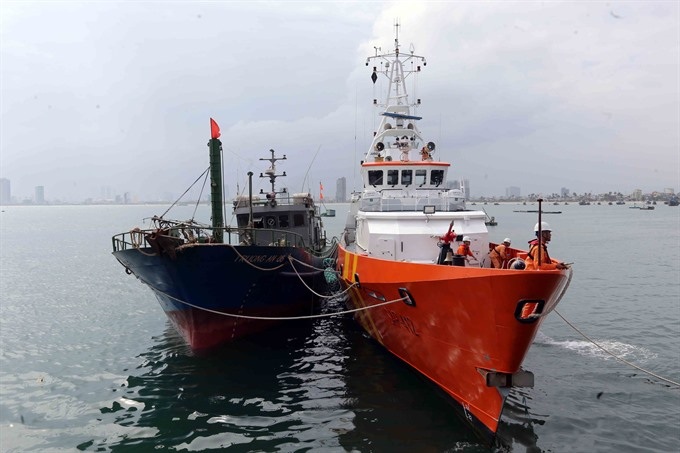
To the rescue: A ship from the Maritime Search and Rescue Co-ordination Centre tows a broken down vessel to port earlier this month
According to the Vietnam Maritime Search and Rescue Co-ordination Centre Region III, in charge of the sea area from south of Ninh Thuận Province to Kiên Giang Province, in 2017 the agency received 183 distress signals, 1.5 times more than in 2016.
The agency had to dispatch rescue ships 37 times to support and rescue a total of 537 people, an increase of more than three times year on year. Despite these efforts, 96 seafarers died or are still missing.
Lương Trường Phi, deputy director of the search-and-rescue centre, said 16 typhoons and many tropical low-pressure systems battered the East Sea were responsible for the higher number of maritime accidents.
The situation was made worse by poor quality of fishing vessels that could not withstand rough waves or gusts of wind.
“During Typhoon Tembin that hit the southern provinces in late December, the centre rescued 10 fishing ships in the seas of Khánh Hoà and Bình Định provinces with either their engines broken or structures broken by the pounding sea,” Phi said.
Phi said fishing ships were most vulnerable to mishaps. Of the 49 vessels that sank in the southern sea last year, 46 were fishing boats - three time more than the previous year.
“Many ships have outdated machinery and lack regular maintenance,” Phi said.
Advocating the Government’s strategy to develop offshore fishing, many fishermen have switched from near-shore fishing to off-shore fishing. However, a large number of fishing vessels were still traditional small, wood-clad vessels, raising the risk of accidents when they are fishing thousands of nautical miles offshore.
According to the Department of Agriculture and Rural Development of Bà Rịa-Vũng Tàu Province, in 2017, more than 49 per cent of fishing vessels in the province switched to offshore fishing.
Trần Xuân Cường, director of the department, said the transformation to large steel-clad or new-material ships suitable for offshore fishing was lower than expected, despite strong support from the Government’s policy with the birth of Decree 67 in 2014.
Until 2017, three years after the decree was issued, only 63 ships were completed in Bà Rịa-Vũng Tàu Province. A major reason was that fishing ports and ship sanctuaries have become seriously overloaded, so not many fishermen dare to invest in new vessels.
The situation is similar in other coastal provinces.
Sector insiders attributed the high number of sea accidents to the low awareness on safety rules by seamen.
Lương Trường Phi from the search-and-rescue centre, said many ship owners, fishermen and crew members either had limited knowledge on maritime safety law or were negligent.
“For example, cuttlefish vessels do their job at night. But during the day, many captains cast anchor right in the shipping lanes to sleep without detailing persons for guard duty,” Phi said, adding that this was extremely dangerous.
“It is regulated that off-shore fishing vessels of 15-m length and above must be equipped with two round lifebuoys and each crewmember must wear life-jacket all the time, but hardly anyone obeys,” Phi said.
Võ Minh, a fisherman in Long Điền District, Bà Rịa – Vũng Tàu Province admitted the reality.
With 30 years spending in the industry, including 20 years as a captain, he said most fishing ships were equipped with safety equipment, such as lifebuoys and life-jackets to cope with the inspection of competent authority when leaving port.
“But when offshore, few fishermen wear life-jackets as they hinder movement,” he said.
Safety largely depended on the awareness of the captain and crew members, but many seamen now were inexperienced, he added.
Many fishermen have left their jobs due to harsh conditions and low incomes, so captains have resorted to hiring inexperienced youths to do the work.
Negligence is also rising among crew members of big cargo ships.
In a serious accident between two cargo ships - the Hải Thành 26-BLC and the Petrolimex - that killed nine people in March last year, four seamen were accused by the prosecutor of failing to perform their jobs patrolling and controlling the vessels, leading to the accident.
Phi said that many ship owners and seamen also underestimated complicated weather leading to accident risks.
“During the recent Typhoon Tembin, a cargo vessel in Vietnam still tried to sail for Singapore despite warnings by authorities. They ended up returning to Côn Đảo Island for safe haven as they couldn’t get through. This shows their recklessness,” he said.
Maritime experts said tightening control over the number and quality of vessels and crewmembers was important to ensure maritime safety.
Competent authorities also needed to reinforce management over shipping lanes, and increase warnings on unsafety risks.
At the local level, Cường from the Bà Rịa-Vũng Tàu agricultural department, said he hoped the central Government would consider more policies to build fishing ports and ship sanctuaries, so that fishermen could feel more secure.
